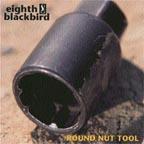
Currently the ensemble-in-residence at Northwestern University and the University of Chicago, eighth blackbird is one of the most talked about names on the contemporary classical music scene. A sextet of flute, clarinet, violin/viola, cello, piano, and percussion, the group released their first cd, Round Nut Tool, in 1999. They have worked with composers such as Joan Tower, who visited Lawrence last year during the women composers week, Michael Torke, who is originally from Milwaukee, and Fred Lerdahl, ’65. They are known not only for their daring programming and exceptional performances of new music, but also for their efforts to teach contemporary performance and support young composers.The name of the group refers to the Wallace Stevens poem, “Thirteen Ways of Looking at a Blackbird.” Steven’s poem is made up of thirteen short stanzas, each of which mentions the blackbird. The role of the blackbird is constantly changing, and as we find in the eighth stanza, the meaning is not always clear. The eighth stanza reads, “I know noble accents/And lucid, inescapable rhythms;/But I know, too,/That the blackbird is involved/In what I know.” As an ensemble, eighth blackbird has found a perfect expression of new classical music: meanings that are perpetually morphing, and are often quite enigmatic.
Round Nut Tool, features pieces by the composers Fred Lerdahl, David Lang, Jacob Druckman, and Thomas Albert. Although the cover gives more of an impression of an indie-folk band, their skills are not to be taken lightly. These pieces demonstrate an impressive range of colors, dynamic, and technical capabilities of the musicians. Furthermore, the group’s ensemble skills are flawless.
The cd is a pleasure to listen to, not only because the group apparently understands some extremely difficult music, but also because the members come from backgrounds similar to most of our own conservatory students. They all received undergraduate degrees in music from the Oberlin Conservatory, and artist diplomas in chamber music from the University of Cincinnati College-Conservatory. They are exciting because they are musicians who studied much like we do here at Lawrence; they chose a daring non-traditional career path, and have been extremely successful. They chose to work outside of the nineteenth century orchestral norm and have found a prestigious place among the new music scene, and even in the academic establishment.
This spring, eighth blackbird will be performing at Lawrence as part of the Artist Series on May 17.
